26 Sep 2023 - {{hitsCtrl.values.hits}}
 Sri Lanka’s apparel exporters want the authorities to negotiate with the United Kingdom (UK) for exemptions under the Developing Countries’ Trading Scheme (DCTS), which replaced the UK’s Generalised Scheme of Preferences (GSP).
Sri Lanka’s apparel exporters want the authorities to negotiate with the United Kingdom (UK) for exemptions under the Developing Countries’ Trading Scheme (DCTS), which replaced the UK’s Generalised Scheme of Preferences (GSP).
In particular, the Joint Apparel Association Forum (JAAF), Sri Lanka’s apex apparel industry body, requests the government to support the industry by applying for extended cumulation and seek a relaxation for non-originating materials with the UK and European Union (EU).
Extended cumulation is a concept in international trade and customs agreements that allows for the accumulation of originating materials or components from multiple countries in the calculation of the origin of a final product.
As defined by the International Trade Centre, rules of origin establish the nationality of a product and thereby determine whether it is eligible to receive trade concessions under a set scheme.
Under the GSP concessions, rules of origin requirements have particularly limited Sri Lanka’s utilisation rate for goods that qualify for duty-free imports at only around 50 percent.
The JAAF pointed out that this hasn’t changed much under the DCTS.
“While the DCTS has provided Sri Lankan exporters with the opportunity to broaden market access and investments, the JAAF believes that the DCTS mirrors restrictions that existed under the UK’s GSP plus concessions. To successfully navigate the current crisis and strengthen our resilience, more is needed,” the JAFF said in a statement.
“Clothing is considered to have originated in a particular country, depending on the number of ‘transformation stages’ carried out in that country. Sri Lanka imports a large part of its textiles and raw material from non-originating countries, thus meeting the rules of origin requirements is particularly challenging.
Even with the many benefits the DCTS accrues for Sri Lanka, the scheme’s rules of origin – at this difficult point – hinder the apparel industry’s ability to reap benefits from the trading scheme. However, the DCTS does allow businesses and governments from non-LDCs to make case-by-case applications for extended cumulation,” it added.
Given the unprecedented financial crisis Sri Lanka has gone through, the JAAF believes that the country deserves such exemptions.
Under the GSP concessions, rules of origin requirements have particularly limited Sri Lanka’s utilisation rate for goods that qualify for duty-free imports at only around 50 percent.
The JAAF pointed out that this hasn’t changed much under the DCTS.
“While the DCTS has provided Sri Lankan exporters with the opportunity to broaden market access and investments, the JAAF believes that the DCTS mirrors restrictions that existed under the UK’s GSP plus concessions. To successfully navigate the current crisis and strengthen our resilience, more is needed,” the JAFF said in a statement.
“Clothing is considered to have originated in a particular country, depending on the number of ‘transformation stages’ carried out in that country. Sri Lanka imports a large part of its textiles and raw material from non-originating countries, thus meeting the rules of origin requirements is particularly challenging.
Even with the many benefits the DCTS accrues for Sri Lanka, the scheme’s rules of origin – at this difficult point – hinder the apparel industry’s ability to reap benefits from the trading scheme. However, the DCTS does allow businesses and governments from non-LDCs to make case-by-case applications for extended cumulation,” it added.
Given the unprecedented financial crisis Sri Lanka has gone through, the JAAF believes that the country deserves such exemptions.
“Cumulation allows material from another country to be considered as ‘originating’ when used in production, as long as that final product has been processed beyond minimal levels. To enable Sri Lanka to draw greater benefits from the scheme, extended cumulation, particularly with the ASEAN countries, should be sought to apply to Sri Lankan apparel, at least for the period during which Sri Lanka is able to overcome the crisis.
The EU’s GSP+ scheme is also being extended in its current format for another three years. The government should use this opportunity and seek to apply the ‘de minimis’ principle for the non-originating components of Sri Lanka’s apparel exports to the EU. This will support the process of getting the country back on its economic growth path, rather than being reliant on financial aid.
A successful negotiation for these exemptions will foster faster recovery from the economic crisis, prevent the decline in exports and restore these to pre-crisis levels, while protecting jobs that could otherwise be lost as export orders fall for a long period,” the JAAF statement noted.
30 Oct 2024 8 minute ago
30 Oct 2024 31 minute ago
30 Oct 2024 59 minute ago
30 Oct 2024 4 hours ago
29 Oct 2024 29 Oct 2024